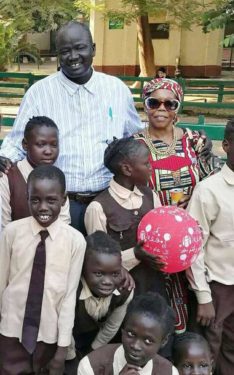
By Engy Magdy, Special to The Tablet
CAIRO – According to Egyptian authorities, there are 5 million refugees and immigrants who are mostly Sudanese that live in Egypt. While Egypt faces economic malaise, Sudanese refugees face a grim situation amid discrimination and violence, and moreover poverty.
Sudanese Father Marco Deng Akot, who works voluntarily for his community in Egypt since 2000 and runs the Sudanese Children Care Educational Center (SCCEC), talked to The Tablet about their problems, the suicide rate and the killing of a Sudanese teacher.
Tablet: How would you describe the situation of Sudanese refugees in Egypt?
Father Deng Akot: Poverty and discrimination are the main problems. The Sudanese refugees in Egypt are placed into four categories. Only blue- and yellow-card holders who are registered with the United Nations receive U.N. assistance.
Annually families get 1500 LE (Egyptian pounds) for every child from the UN through Catholic Relief Services (CRS). This is not quite enough given the price of schools in Egypt and the cost of living, while the state does not provide any assistance to the Sudanese. Sometimes CRS provides medical assistance, but in very poor hospitals that do not provide advanced services.
There are cheaper schools for Sudanese refugees.
There are Sudanese schools that cost 3,000 LE for the child, yearly. But at the end, the assistance provided by UN is not enough to cover all expenses which reach to 10,000 LE yearly. Some families have to use the assistance money to rent a home and do not send the children to school.
In my educational center SCCEC, work is voluntary so we charge a small fee. The child pays 750 LE a year and if his family can’t pay, it is not a problem. We serve any Sudanese regardless of religion. I have 450 children, 10 percent are Muslims, and we serve the Sudanese community from South Sudan who is mostly Christians. 98 percent of refugees from southern Sudan are Christians, while those from northern Sudan are 80 percent Muslim.
There are lots of children who can’t find places, for example in my center I have 1,000 children on the waiting list.
What is the psychological and spiritual situation of the Sudanese refugees in Egypt?
The suicide rate is very high among Sudanese in Egypt. There are two to three cases of suicides every week, especially among students due to poverty. There are no jobs for Sudanese in Egypt. Most work in cleaning houses and shops. A Sudanese refugee, even if he has a doctorate, works as a cleaner because according to the residence permit “work is not permitted.”
A Sudanese teacher was killed by an Egyptian bully. What happened?
I founded the educational center in 2007, and it includes stages of kindergarten to secondary school. We hold literacy classes in the evening. There are two neighbors, one of them a taxi driver, who is follower of Muslim Brotherhood group, and his friend Imad Hamdi. They always accuse us of getting support from America, Israel and Zionist organizations. Hamdi, who has a store selling building materials, used to release his dog to scare the center children. He has hatred and racism towards us.
I warned him more than once that this is abuse against the children. Also he used to physically assault teachers and slap them.
On Feb. 9 2017, while the children were leaving the center, Hamdi released his dog at them. The teacher, Gabriel Tut Lamm, 59, told him: “Shame on you … those are like your children. They should not be terrorized.” Gabriel then returned to the center, but minutes later the store owner attacked the school and the teachers describing them “animals, dogs who do not understand” and uttered other insults.
He returned back to the store after a neighbor blamed him. But he came back again with a metal bar in his hand and beat Gabriel on his head and ran away.
The webcam showed the taxi driver Muhammad Shawki taking to Hamdi before coming back and killing Gabriel. I think he incited him against us. He told me before: “I do not deal with blacks and Christians.”
Then what happened?
He was arrested and kept in prison for two months, but released on bail. We do not know on what basis he was released.
He was sentenced to 15 years in prison in absentia. Even after the police arrested him, he was released on the spot as he appealed. Since then he refrains from attending any sessions while the judge has been postponing the case every time.
I received death threats … to force me to abandon the case. As the murderer returned to the area, he opened his store and tries to harass us to drag us to fight.
What about the Gabriel family?
He has a wife and two children. Their living conditions are very harsh as there is no one helps them. They do not receive UN assistance because the children are not in school. The wife is psychologically damaged since her husband’s death.
How do the Egyptian authorities treat you?
During raids, security forces arrest people randomly even those who have a residence permit. Sudanese refugees are arrested and held in custody for at least a week until the investigation is completed and the residence is confirmed.
